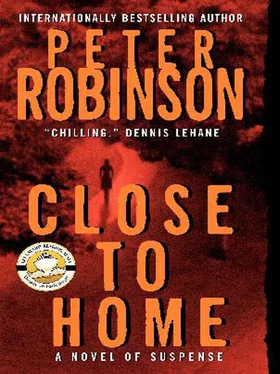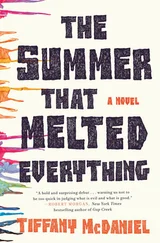At the eastern end of the estate, Wilmer Road separated the Hazels from an area of older houses, soon to be demolished. It was at the T-junction between Wilmer and Hazel Crescent that Graham had delivered his last newspaper, a News of the World, to Mr. and Mrs. Halloran, who lived in the corner house.
The next delivery was supposed to be to one of the houses across the road, but the Lintons there said they never received their Observer that day. Nobody else on the other side of Wilmer Road received a newspaper that morning, either.
The anonymous mapmaker had also calculated that it would have been around 6:30 A.M. when Graham, who started at 6 A.M., got to that part of his round – daylight at that time of year, but still very early in the morning for any sort of traffic, including pedestrian. It was a Sunday, after all, the traditional morning for a lie-in after the excesses of Saturday night, and most of the customers said they were still in bed when their papers arrived.
Michelle looked at the old black-and-white photos. They depicted a very different scene from the one she had visited yesterday, after she had talked to the Marshalls. In 1965, across Wilmer Road, there had been a grim row of old shops, all boarded up and ready for demolition, but today a modern DIY center stood next to the new estate, which had replaced the old houses. The derelict shops looked like just the sort of place a kid might want to explore. Michelle checked the file to see if they had been searched. Of course they had. Dogs brought in, too. Not a trace.
Michelle tucked some strands of blond hair, which had been tickling her cheek, behind her ears and chewed at the end of her pen as she read over transcripts of the initial interviews. Nearly everything was typed, of course, except some of the documents that were handwritten, and the results looked strange, with the uneven pressure of the keys and the occasional blob of a deformed e or g . Such distinguishing features used to be very handy for identifying which machine a note had been typed on, Michelle reflected, before the anonymity of laser printers. Some of the papers were carbon copies, faint and often hard to read. Occasionally, illegible amendments had been made in pen or pencil between the lines, the original words scratched out. All in all, not a promising start.
Detective Superintendent Benjamin Shaw, now one of the senior officers at Thorpe Wood, was named once or twice as a detective constable on the case. Michelle knew that Shaw had started his career in Peterborough and had recently returned from six years with the Lincolnshire Constabulary, but it still surprised her to see his name in connection with something that happened so long ago. Maybe she could have a word with him, see if he had any theories that hadn’t made it into the files.
It seemed that the first person to miss Graham Marshall was his employer, Donald Bradford, owner of the newsagent’s shop. Bradford lived some distance away from the shop and employed a local woman to open up, not arriving himself until eight o’clock. According to Bradford’s statement, when Graham hadn’t returned by eight-fifteen that Sunday, half an hour late for his second round on a neighboring estate, Bradford drove around the Wilmer Road Estate in search of him. He found nothing. Whatever had happened to Graham, his papers and his canvas bag were missing, too. Michelle was willing to bet that some of those scraps of cloth found with the bones came from Graham’s newspaper sack.
After that, Donald Bradford called at Graham’s house to see if the lad had become ill and hurried home without stopping to report in. He hadn’t. Graham’s parents, now also worried, searched the estate for their son and found nothing. With news of the Manchester child abductions still fresh in the public eye, both Bradford and the Marshalls were soon concerned enough to call in the police, and a short while after that, the official investigation began. Preliminary inquiries were carried out in the immediate area, and Detective Superintendent Harris was put in charge first thing the following day, when still no trace had been found of Graham, and the cumbersome but efficient mechanics of a police investigation groaned into action.
Michelle stretched and tried to work out a crick in her neck without success. It was hot in the office and her tights were killing her. DC Collins, just back from Cambridge, took pity on her and said, “I’m just off to the canteen, ma’m. Bring you anything?”
“I’d love a diet Coke, please,” said Michelle. “And maybe a slice of chocolate gâteau, if they’ve got any left.” She reached for her handbag.
“It’s all right,” said Collins. “Pay me when I get back.”
Michelle thanked him, adjusted her tights as discreetly as possible below her desk and turned back to the files. As far as she could gather from a cursory glance, there hadn’t been any leads at all. Police had interviewed everyone on Graham’s round, along with all his friends, family and schoolteachers. None of it led anywhere. Graham was described, among other things, as being bright, cheeky, quiet, polite, rude, sweet-natured, foul-mouthed, talented and secretive. Which pretty much covered every eventuality.
Nobody on Wilmer Road had seen or heard anything unusual that morning – no screams, shouts or sounds of a struggle – though one person said he had heard a car door bang around half past six. There were no convenient dog walkers, and even the most devout of churchgoers, being for the most part Methodists or Low Anglican, were still in the Land of Nod. All the evidence, especially the missing paper sack, suggested that Graham had most likely got in a car willingly, with someone he knew, someone local. But who? And why?
DC Collins returned with Michelle’s diet Coke. “No gâteau, I’m afraid,” he said, “so I brought you a Danish instead.”
“Thanks,” said Michelle, who didn’t like Danish but paid him anyway, nibbled at it awhile, then dropped the rest in her waste bin and went back to her files. The Coke tin was cold and wet, so she pressed it against her flushed cheek and enjoyed the icy sensation, then she did the same with her other cheek and her forehead.
The police at the time didn’t neglect the possibility that Graham might have run away under his own steam, dumping the sack of papers somewhere and heading for the bright lights of London like so many young lads had in the mid-sixties, but they could find nothing at all to support this theory. His home life seemed happy enough, and none of his friends suggested that he was at all interested in running away from home. The sack was never found, either. Even so, missing persons reports went out all over the country, and there were the usual sightings, none of which amounted to anything.
The interviews also turned up nothing, and police checks into the records of several estate dwellers drew a blank. Michelle could read a little excitement between the lines when police discovered that one of the deliveries on Graham’s route was the house of a man who had served time for exposing himself in a local park, but subsequent interviews – no doubt involving some very rough business, knowing police methods of the time and Jet Harris’s reputation as a tough guy – led nowhere, and the man was exonerated.
Michelle slipped off her reading glasses and rubbed her tired eyes. At first glance, she had to admit that it seemed very much as if Graham Marshall had disappeared into the void. But she knew one thing that the police hadn’t known in 1965. She had seen his bones, and she knew that Graham had been murdered.
Annie Cabbot drove out to Swainsdale Hall mid-morning to tie up a few loose ends with the Armitages. The sun had come to the Yorkshire Dales at last, and wraiths of mist rose from the roadsides and the fields that stretched up the dale-sides. The grass was bright green after so much rain, and the limestone walls and buildings shone clean gray. The view from the front of Swainsdale Hall was magnificent, and Annie could see plenty of blue sky beyond Fremlington Edge, with only a few light fluffy clouds scudding by on the breeze.
Читать дальше












